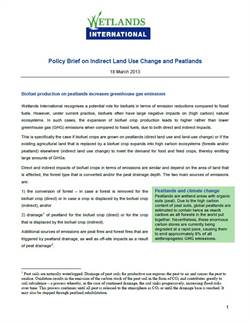
EU energy ministers endorse unsustainable biofuels targets
Brussels. European Union energy ministers decided not to account for the real greenhouse gas emissions caused by biofuels used for transport in the EU. In a political agreement reached today, ministers refused to reflect indirect land-use change (ILUC) in GHG accounting and subsidy schemes for biofuels.
Ministers recognised that “it is likely that greenhouse gas emissions linked to indirect land-use change are significant, and could negate some or all of the greenhouse gas savings of individual biofuels”. However, instead of addressing this concern by imposing mandatory accounting of indirect land-use change (ILUC) emissions of biofuels, the Energy Council suggest that the European Commission merely report them.
ILUC and peatlands
ILUC happens when a bioenergy crop is grown on existing agricultural land, meaning that the previous crop is displaced to a new location – often leading to the conversion of other land or wetlands into agricultural land. The conversion of high carbon ecosystems (such as tropical forests and/or peatlands) results in large greenhouse gas (GHG) emissions.
Under the EU’s Renewable Energy Directive (RED), Member States are required to ensure that by 2020 at least 10% of final energy consumption in the transport sector comes from renewable energy sources. Biofuels are expected to be the biggest contributors to this target, and as such the RED foresees subsidy schemes to support biofuels that ensure a certain amount of emissions savings and comply with a set of sustainability criteria. Only those biofuels can be counted towards the 10% target.
By putting in place mere reporting rather than accounting for ILUC, the Council has opened the door to subsidies being given to biofuels even if it is known that their ILUC emissions negate their GHG savings. This is the case, for instance, when biofuel production leads to the expansion of agriculture on peatlands: biofuels produced on organic soils can actually generate more CO2 than conventional (fossil) fuels. Under the Council’s text, even such “dirty” biofuels can count towards the 10% target.
Impact on global food supplies
The political agreement seeks to limit the impact of biofuel production on global food supplies, by setting a limit on biofuels from food crops at 7% of all transport energy by 2020, in a move widely criticised by NGOs as being insufficient and in contradiction with the stricter limit of 5% proposed by the European Commission. Furthermore, a 0.5% indicative non-binding sub-target for ‘advanced’ biofuels was introduced. The so-called ‘advanced’ biofuels are biofuels which do not compete for agricultural land, as they are not produced from food crops, but rather from wastes and non-food sources such as algae.
Next steps
The Council’s political agreement will now be reviewed by the European Parliament, with a view to finalising the legislative process by the end of 2014.
Further reading:
Download:

